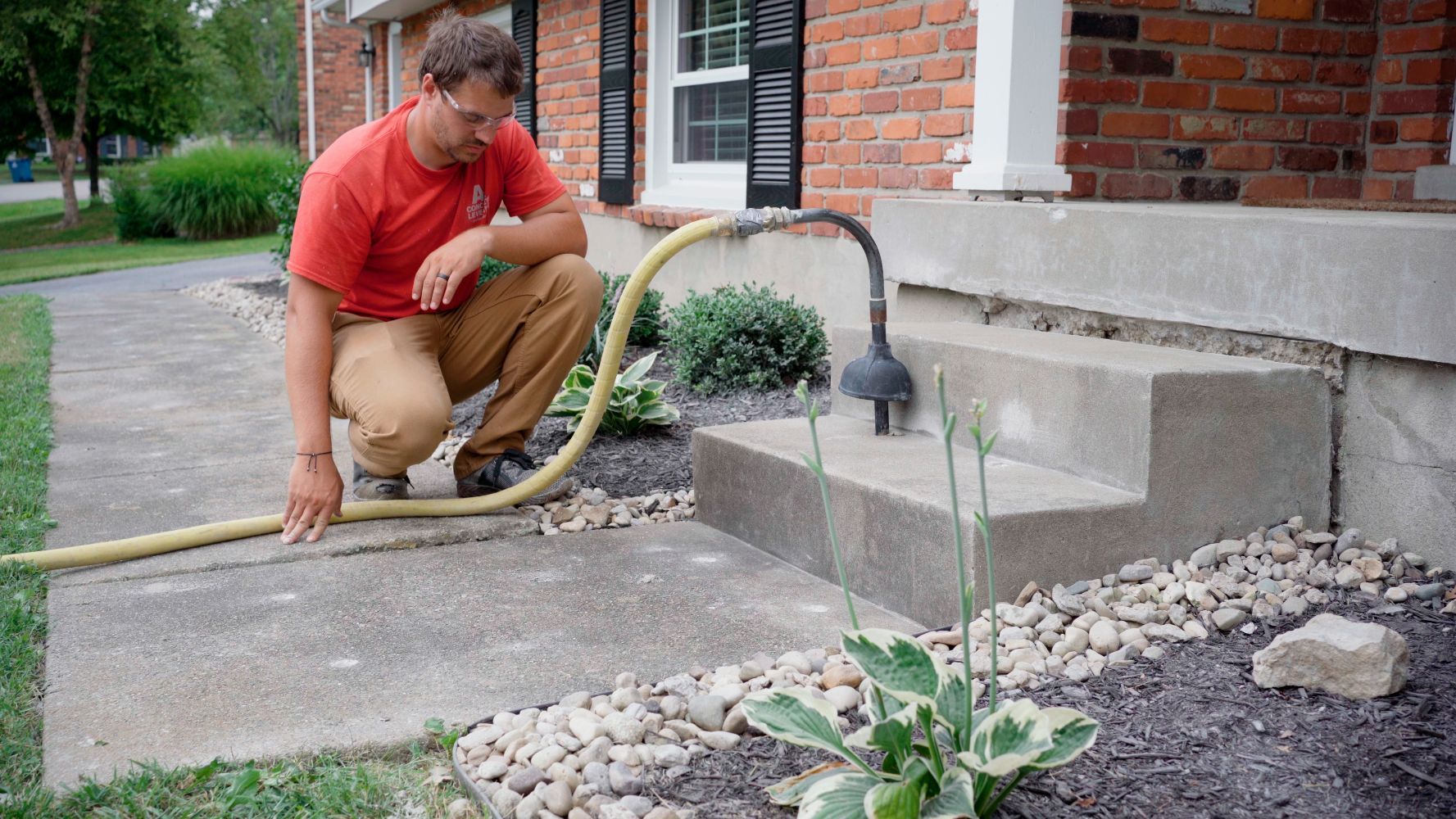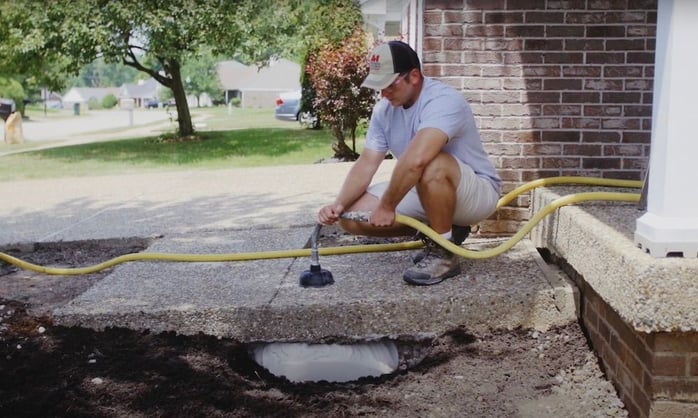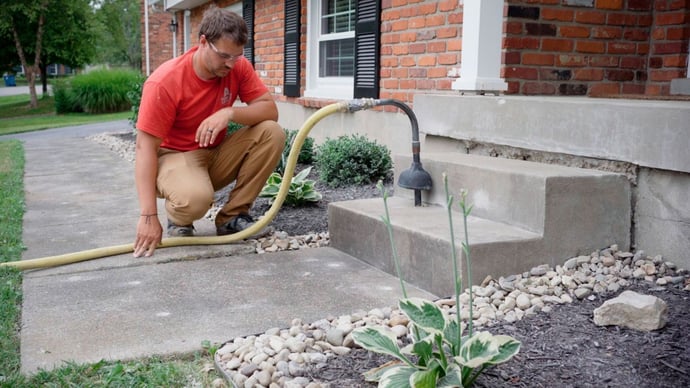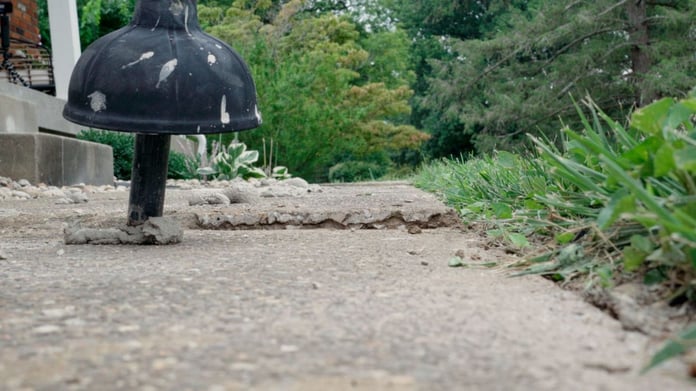All About Concrete Leveling: Process, Cost, Types, FAQ, and More
October 14th, 2025 | 3 min. read
By Sarah Etler

Learn everything you need to know about concrete leveling in this ultimate guide.
Concrete leveling is one of the fastest and most cost-effective ways to restore safety and appearance to your sidewalks, driveways, patios, and more.
Instead of tearing out and replacing slabs, leveling lifts them back into place, often within hours and for up to 70% less than replacement.
TL;DR
Concrete leveling raises sunken concrete back into place without replacing it. It works by drilling small holes in the slab, pumping in grout, foam, or mud, and sealing the holes. On average, leveling costs 50–70% less than replacement, can last for the life of the concrete, and is typically completed in a single day.
In This Article
What Is Concrete Leveling?
Concrete leveling is the process of lifting settled concrete slabs back to their original position without replacing them. It often goes by other names, including:
- Concrete lifting
- Concrete raising
- Concrete jacking
- Slabjacking
- Mudjacking (a specific method of leveling)
No matter the terminology, the goal is the same: safely and quickly restore your concrete to a level, stable position.

How Does Concrete Leveling Work?
The concrete leveling process follows three basic steps:
- Drill small holes through the slab (⅝ to 2½ inches in diameter, depending on the method).
- Pump in leveling compound (stone slurry, polyurethane foam, or mud). The material flows beneath the slab, filling voids and lifting the concrete.
- Seal the drill holes for a finished look.
Related Resource: What To Expect at Your Concrete Leveling Appointment
Types of Concrete Leveling
There are three primary concrete leveling methods:
Stone Slurry Grout Concrete Leveling
Stone slurry grout concrete leveling uses a mix of pulverized limestone and water to gradually lift sunken slabs.
- Limestone slurry allows for adjustable thickness to increase precision
- Best for residential and commercial slabs needing both lift and void fill.
Related Resource: The Pros and Cons of Stone Slurry Grout Leveling
Foam Concrete Leveling
Polyjacking is a method of lifting concrete that uses expanding polyurethane foam.
When the foam is injected under the slab, its chemical reaction causes the foam to expand rapidly and lift the settled slab.
Related Resource: The Pros and Cons of Foam Concrete Leveling
Mudjacking
Mudjacking is a method of leveling concrete that pumps a soil, sand, and water mixture under the concrete slab in order to lift it up.
“Mudjacking” is a well-known name for concrete leveling involving a slurry-type mixture, even though it is distinct from A-1’s limestone slurry grout leveling process.
Related Resource: The Pros and Cons of Mudjacking

Concrete Leveling Costs
Here’s what you can expect to pay for common concrete leveling projects:
| Service | Stone Slurry Grout Leveling | Foam Concrete Leveling | Mudjacking |
|---|---|---|---|
| Sidewalk Concrete Leveling | $750 - $2,400 | $1,015 - $3,240 | $675 - $2,160 |
| Garage Floor Concrete Leveling | $900 - $4,500 | $1,215 - $6,075 | $810 - $4,050 |
| Porch Concrete Leveling |
$1,200 - $6,000 |
$1,620 - $8,100 |
$1,080 - $5,400 |
|
Pool Deck Concrete Leveling |
$1,500 - $4,400 |
$2,025 - $5,940 |
$1,350 - $3,960 |
|
Driveway Concrete Leveling |
$900 - $4,200 |
$1,215 - $5,670 |
$810 - $3,780 |
|
Steps Concrete Leveling |
$990 - $2,400 |
$1,335 - $3,240 |
$890 - $2,160 |
|
Patio Concrete Leveling |
$900 - $3,500 |
$1,215 - $4,725 |
$810 - $3,150 |
|
Interior Floor Concrete Leveling |
$1,400 - $6,000 |
$1,890 - $8,100 |
$1,260 - $5,400 |
|
AC Pad Concrete Leveling |
$750 - $1,400 |
$1,015 - $2,485 |
$675 - $1,260 |
Related Resource: Concrete Leveling Cost Guide
Ready for exact pricing? Request a Free Estimate
The Pros and Cons of Concrete Leveling
Pros
- Cost Savings: Up to 70% less than replacement.
- Fast Turnaround: Often completed in hours.
- Minimal Disruption: No demolition, landscaping damage, or long cure times.
- Seamless Look: Keeps original slabs, avoiding mismatched new concrete.
Cons
- Cracks Remain: Leveling doesn’t erase cracks (though they can be caulked).
- Uncertain Conditions: Hidden soil issues can affect results.
- Soil Dependency: Long-term success depends on the stability of underlying soil.
Related Resource: The Pros and Cons of Concrete Leveling

When To Level Your Concrete
Leveling is a good solution if you’re dealing with:
- Trip hazards
- Sinking garage or basement floors
- Voids from erosion
- Settling concrete steps
- Water drainage issues
- Minor lifting due to tree roots
Related Resource: 7 Common Problems Concrete Leveling Can Solve
When Not To Level Your Concrete
Skip concrete leveling if:
- Your slab is severely cracked or crumbling
- You want a new surface texture or finish
- Slabs are raised too high by tree roots
- You want to redesign the layout or functionality (e.g., add steps)
Related Resource: Top 5 Reasons To Avoid Concrete Leveling
Is Concrete Leveling Right for You?
Concrete leveling is often the smartest, most cost-effective way to restore safety and appearance without full replacement. But the right solution depends on your slab’s condition, soil stability, and repair goals.
A-1 Concrete Leveling has been lifting concrete nationwide for over 30 years. Whether it’s a sidewalk, driveway, pool deck, or anything in between, our team can evaluate your slab and provide a customized repair plan.
Request your free estimate today and see how concrete leveling can restore your concrete.
Still Deciding?
- How Much Does Concrete Leveling Cost?
- How Long Does Concrete Leveling Last?
- When Is Concrete Too Far Gone for Concrete Leveling?
Concrete Leveling FAQ
How long does concrete leveling last?
With proper maintenance, leveling can last 20 to 50+ years, or the lifespan of the slab itself.
Related Resource: How Long Does Concrete Leveling Last?
How long does concrete leveling take?
Most concrete leveling jobs are completed within a few hours, with larger projects taking 1 to 3 days.
Which concrete leveling method is best?
Each concrete leveling method comes with its own pros and cons, so one is not inherently better than the other.
The following resource can help you compare each method and decide which is best for you:
Sarah Etler joined A-1 Concrete Leveling after receiving her Bachelor of Arts degree in English from Northern Kentucky University. As A-1's Content Marketing Manager, she works closely with industry experts to produce content that will best answer questions related to concrete repair and maintenance practices. Sarah loves living a life full of discovery and is excited every day to see what new things she can learn and share with those around her.
Topics: